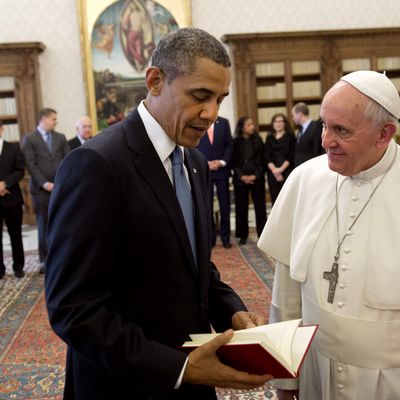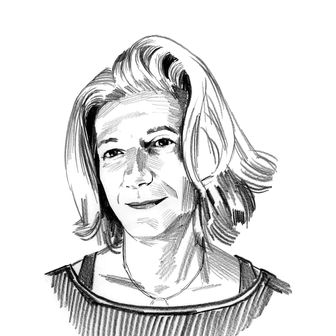
This morning, at the Vatican, President Barack Obama and Pope Francis engaged in a ritual as ancient as the conveyance across international borders of frankincense and myrrh: They exchanged gifts. In an acknowledgement of the pope’s devotion to the Christian value of humility, Obama gave Francis a box of seeds from the White House garden. (During his audience with Benedict XVI in 2009, Obama came bearing a very different kind of present: an ivory stole, embroidered in gold, crimson, and blue. Benedict, unlike Francis, had a predilection for the flamboyant garb to which his position entitled him.)
Francis gave Obama a plaque and a copy of his “apostolic exhortation” Evangelii Gaudium, which he released last November. “I will treasure this,” Obama said, in thanks. “I actually will probably read this in the Oval Office when I’m deeply frustrated. I’m sure it will give me strength and calm me down.”
In truth, it’s rarely much fun to be given a copy of someone’s book, a gift that shows a lack of imagination on the part of the giver and bestows upon the recipient an unsolicited obligation. But this case is different. Evangelii Gaudium (which means “The Joy of the Gospel”) is Francis’s passionate manifesto, written not in the obscure, Latinate phrases of his predecessor, but in language that might easily be quoted, tweeted, and copied on T-shirts and coffee mugs. One can easily imagine the president, who has previously confessed to a love for Niebuhr and the works of St. Augustine, finding late-night sustenance and edification there. Here, some examples of what he might find.
An argument for living a life of joy. “The great danger in today’s world, pervaded as it is by consumerism, is the desolation and anguish born of a complacent yet covetous heart, the feverish pursuit of frivolous pleasures, and a blunted conscience.” Francis rails against a “defeatism which turns us into querulous and disillusioned pessimists” and against those he calls “sourpusses.”
An excoriation of those who are too busy, or too preoccupied, to serve the poor. “How can it be that it is not a news item when an elderly homeless person dies of exposure, but it is news when the stock market loses two points?”
A conviction about the evils of free-market capitalism. “The culture of prosperity deadens us,” he writes. And later: “Money must serve, not rule!”
A critique of clergy too invested in protecting their own power (and, implicitly, of the bishops who shielded sexual abusers in their dioceses). “Their hearts are open only to the limited horizon of their own immanence and interests, and as a consequence they neither learn from their sins nor are they genuinely open to forgiveness. This is a tremendous corruption disguised as good.”
And a shout-out to all the hardworking priests and laypeople who have devoted themselves to a troubled church in troubled times. “The pain and shame we feel at the sins of some members of the Church, and at our own, must never make us forget how many Christians are giving their lives in love.”
A commitment to the rights of women, especially poor women, as equal, even as he upholds a centuries-old view of women as uniquely “sensitive,” “intuitive,” and skilled at interpersonal relations. “I think, for example, of the special concern which women show to others, which finds a particular, even if not exclusive, expression in motherhood.”
And yet: a reaffirmation of his commitment to an all-male clergy. “The reservation of the priesthood to males, as a sign of Christ the Spouse who gives himself in the Eucharist, is not a question open to discussion.”
Incredible optimism. “We love this magnificent planet on which God has put us, and we love the human family which dwells here, with all its tragedies and struggles, its hopes and aspirations, its strengths and weaknesses.”
Tender concern for the environment. “We can feel the desertification of the soil almost as a physical ailment, and the extinction of a species as a painful disfigurement.”
The hardest of lines on abortion. “Among the vulnerable for whom the Church wishes to care with particular love and concern are unborn children, the most defenseless and innocent among us. Nowadays efforts are being made to deny them their human dignity and do with them whatever one pleases, taking their lives and passing laws preventing anyone from standing in the way of this.”
There’s more: on homiletics, and interfaith dialogue, and on the responsibility of the church to be at once both present at family dinner and outspoken on the global stage. One can imagine Obama admiring this work, even as he envies it. The Pope, who is not democratically elected, can speak his mind without worrying about a gridlocked Congress. And though they differ on certain matters of import, they share a conviction about religious faith as something that people act upon and not just talk about. In his Chicago church, Obama learned that “through good works we could find order and meaning here on Earth and transcend our limits and our flaws and foibles,” he told me when I interviewed him in the summer of 2008 for Newsweek. Francis believes the same. “Realities are greater than ideas,” he writes in Evangelii Gaudium.






























